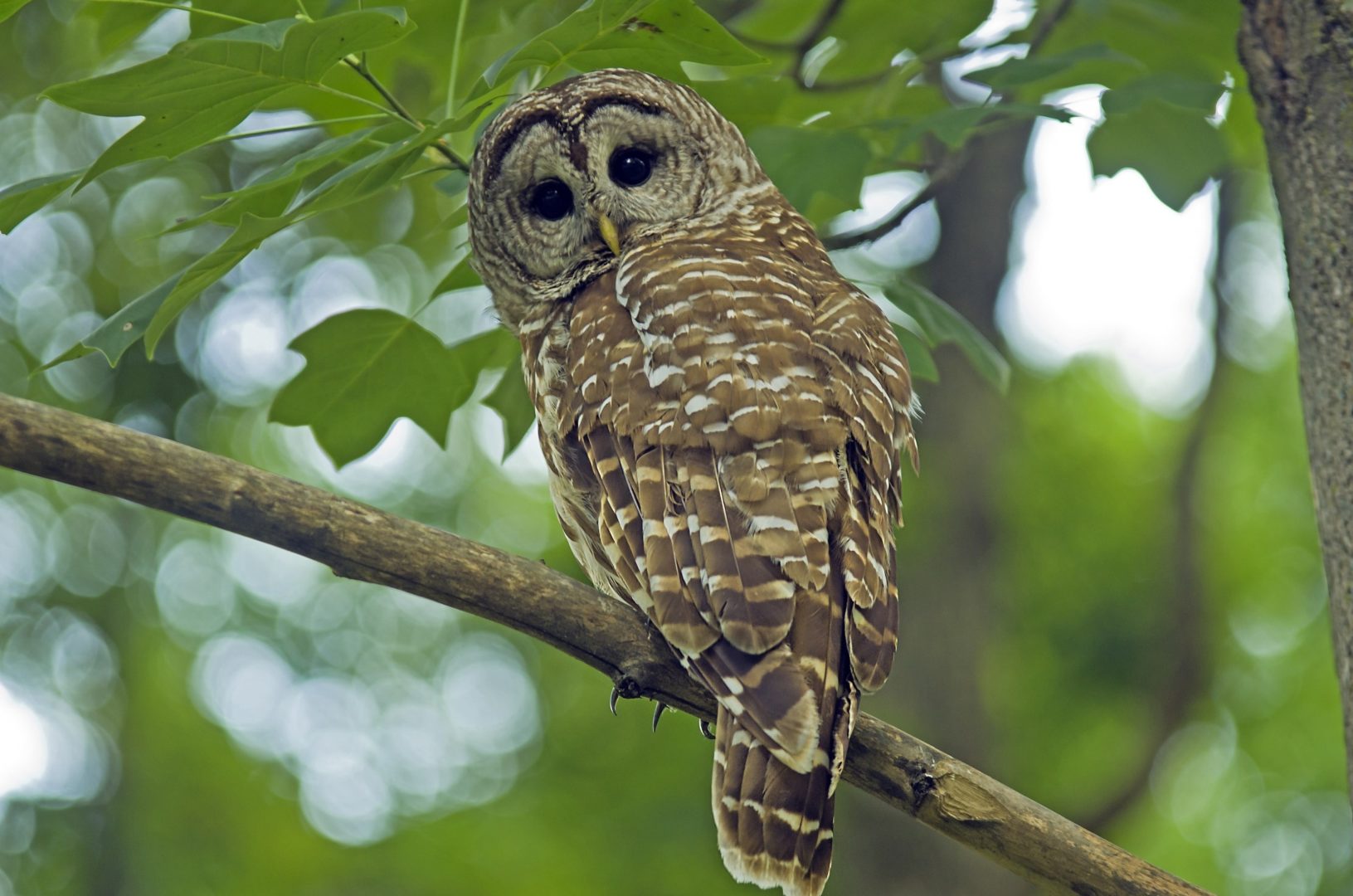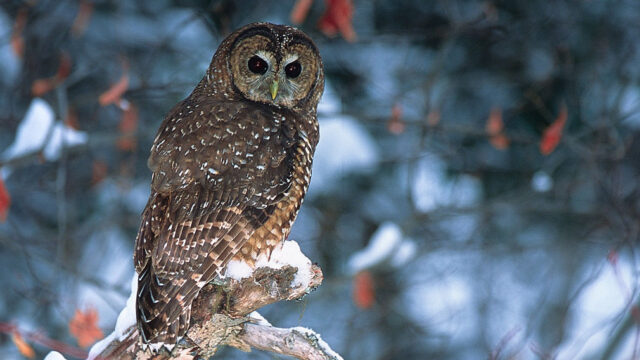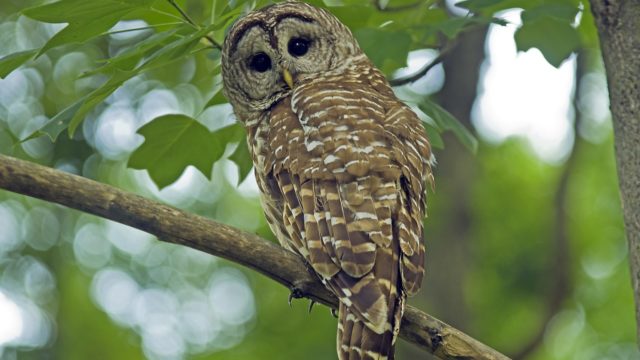This historic hearing is a culmination of more than 25 years of efforts by the group to save the spotted owl from extirpation in Canada.
səl̓ílwətaʔɬ (Tsleil-Waututh), xʷməθkwəy̓əm (Musqueam) and Skwxwú7mesh (Squamish) Territories (Vancouver, B.C.) – Wilderness Committee, represented by lawyers from environmental law charity Ecojustice, is in federal court today, challenging the eight-month delay of Federal Minister of Environment and Climate Change Steven Guilbeault to recommend cabinet issue an emergency order to prevent the extinction of the Spotted Owl in Canada.
At the 1.5-day hearing, the group will argue this delay in recommending the order to halt imminent logging planned in habitat necessary for the recovery of the owl in B.C. was unlawful. If successful, this case could provide direction on how the minister must recommend emergency orders quickly to protect species from imminent threats to their survival and recovery.
“Throughout spring and summer, we documented how Guilbeault’s delay meant the B.C. government continued indiscriminate logging of the Spotted Owl’s old-growth habitat,” said Wilderness Committee National Campaign Director Torrance Coste. “And with the cabinet’s rejection of the order last month, B.C. can and will continue to approve logging of the owl’s home. With only one wild-born owl remaining, urgent action is needed before the provincial government sentences this species to death in Canada.”
In January, Guilbeault determined that 25 square km of critical old-growth habitat was threatened by logging planned for this year and needed to be protected for Spotted Owl recovery. This was in response to an October 2022 petition by the Wilderness Committee. However, Guilbeault only recommended cabinet issue an emergency order in late September — an order the cabinet was swift to reject.
“Since January 2023, when the minister determined imminent logging in Spotted Owl habitat jeopardized the recovery of species, B.C. and Canada have taken a “talk and log” approach — arguing about whether the most endangered bird in Canada actually needs habitat protection while logging of this habitat continued unabated,” said Ecojustice lawyer Andhra Azevedo. “Rather than take emergency action to step in where B.C. was failing, the Minister’s delay allowed for B.C. to further threaten the recovery of the species by logging its habitat. The eight-month delay to recommend an emergency order followed by cabinet’s denial of the order makes a mockery of emergency orders under the Species at Risk Act.”
There is only one known wild-born owl still living in the forest, located in the Fraser Canyon region of B.C. Two captive-bred owls released last fall were later found dead. Two more captive-bred owls were released to the wild earlier this year.
“How can Canada delay and then walk away from an emergency order to protect the Spotted Owl, a species in such a dire state of emergency?” said Spô’zêm First Nation Chief James Hobart. “It’s disappointing that at a time when B.C. and First Nations have experienced some of the worst forest fires, you have the province’s own logging company BC Timber Sales telling logging companies they can cut through the old-growth in deferral areas. For the feds to just walk away from it as though it wasn’t important is really troubling.”
Canadian Wildlife Service scientists believe the recovery of the species is biologically and technically possible. However, the success of reintroduction depends on protecting the critical old-growth habitat the spotted owl requires to survive and recover to a stable population.
Background:
Before industrial logging in British Columbia, there were an estimated 500 pairs of Spotted Owls living in the old-growth forests of southwest B.C. Today, there is only one wild-born owl left in the wild in Canada.
This dramatic decline led Ecojustice lawyers to send a letter on behalf of Wilderness Committee to the federal minister of environment and climate change in October 2020, demanding he recommend emergency order protections for the habitat of the last wild owls in the Spuzzum watershed to cabinet under the Species at Risk Act. The letter argued that decades of provincial mismanagement had left Spotted Owls without legal protection and decimated the old-growth forests where they once lived.
In February 2021, thanks to the leadership of the Spo’zem First Nation and with support from Ecojustice and Wilderness Committee, the provincial government announced a one-year halt to all logging within the Spuzzum and Utzlius watersheds. These watersheds are home to the last remaining Spotted Owl in Canada. The provincial government recently extended the logging deferrals in these watersheds to February 2025.
Despite the temporary protection of these two watersheds, logging of Spotted Owl habitat continues outside these areas and jeopardizes the recovery of the species. Recovery of the species requires habitat to be protected so owls have a place to live when they migrate or are released from the captive breeding program currently operated by the provincial government.
That is why in October 2022, Ecojustice lawyers, on behalf of the Wilderness Committee, once again petitioned the federal minister of environment and climate change to fulfil his legal responsibility to protect this species and their habitat by recommending to cabinet the issuing of an emergency order to protect the habitat necessary for the Spotted Owl to survive and recover. This habitat is threatened by hundreds of approved and proposed logging cutblocks.
About:
The Wilderness Committee works to protect life-giving biological diversity through strategic research, community mobilizing, and grassroots public education. Their offices are in Vancouver, Victoria, Winnipeg and Toronto, with supporters, volunteers and activists from coast to coast to coast. They take action to protect nature, defend wildlife and fight for a stable and healthy climate.
Ecojustice uses the power of the law to defend nature, combat climate change and fight for a healthy environment. Its strategic, public interest lawsuits and advocacy lead to precedent-setting court decisions, law and policy that deliver lasting solutions to Canada’s most urgent environmental problems. As Canada’s largest environmental law charity, Ecojustice operates offices in Vancouver, Calgary, Toronto, Ottawa and Halifax.



